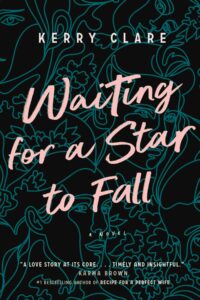October 16, 2020
Petra, by Shaena Lambert
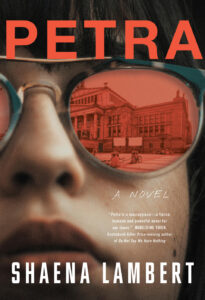
I keep imagining the opportunity to interview Shaena Lambert, and the inevitable question: “So why HAVE you chosen to tell the story of Petra Kelly, German Activist and leading force in the creation of The Green Party in the 1980s?” Though I think I already know the answer, and it’s mainly to do with the expansive possibilities of fiction, and how it can shine a light into dark corners that no archive could hope to illuminate. The limits of nonfiction too for a figure whose mythology was almost as important as the facts of her character. And yet that forty years after her fame and three decades after her death that she’s become an unknown, another woman cast aside under the pounding waves of history. So what does it mean then for me to be encountering Petra Kelly for the first time through Lambert’s fictional lens as I have done while reading her novel Petra? It’s destabilizing, a fictional biography, though perhaps in a way that Petra Kelly herself might have appreciated. Or so I can speculate…
While Petra herself was real, all the other characters in the book are invented, or created as composites of actual figures. The story told from the point of view of a Manfred Schwartz, once Petra’s lover, and then her colleague in government as the Greens are elected to office in 1983 on a rising tide of popularity. Manfred never really gets over Petra, but then Lambert’s Petra is the type you don’t. A German who grew up in America in the 1960s and brings that same idealism to the divided Germany in what would turn out to be the last days of the Cold War—but nobody knew that then. Idealistic, uncompromising, seeing the world and its issues as interconnected as her Marxist colleagues never would.
Defying expectation at every turn, Kelly falls in love with an ex-NATO General, a love story with a sorry end. Which also might be part of the reason why Lambert imagines up the figure of Kelly’s General lover from scratch in her novel, for the unfathomability of his actions. Fiction permitting the author more latitude for the fathoming, imagining this figure who’d grown up in Nazi German, fought for the Germans in World War Two, the atrocities that he would have been party to, and how a person lives with that.
The novel takes the form of a historical record created by Manfred, who is still under Petra’s spell after all these years, and is trying to make sense of what happened between them and of her character in general. A proxy for the author herself, I suppose, and the answer the question I was pondering at the beginning of this review comes with a line near the end of the book, delivered by Manfred’s wife: “Maybe you simply can’t make sense of it all…I mean, maybe it—the past—doesn’t take the form of a thesis.” Which is where the art comes in, the role of literature, to make a sense out of something that doesn’t make sense at all.
By the end of the book, Petra has become a full-fledged spy novel, as we learn who among the Greens had been acting as Soviet agents, this information offering some illumination to Manfred about what had gone on decades before. Petra herself, however, remains somewhat in the shadows, the reader feeling the same frustration experienced by Manfred at how elusive her true nature remains, at how many of her secrets would die with her.
But that she is known through this book, if not actually understood, doesn’t lessen the novel’s impact, and in fact makes it all the more engaging, and in accordance with what actually happens in the world.
October 14, 2020
STAR TO FALL Tea Blend
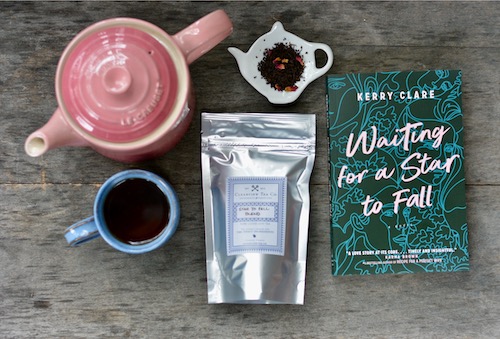
The OFFICIAL tea blend of WAITING FOR A STAR TO FALL is now for sale from Clearview Tea. An organic black tea blend featuring vanilla, bergamot and rose petals, the tea is the perfect complement to my novel—and it’s delicious. Thanks so much to Clearview Tea for this fun partnership.
October 13, 2020
Gleanings

- To me, the thrust of the novel seems rather to be “how many intended kindnesses can lead to mistakes.”
- One of the silver linings of Covid, is seeing how imaginative and resourceful people can be in times of challenge.
- Poetry has the capacity to lead us through our lives, giving us courage to step over the thresholds, to push the creaky gate on the hinges that are our own bodies thinking, remembering…
- When you feel yourself getting defensive, when you have an urge to argue with what you’re hearing, why not take that as an invitation?
- I’m still here – which is exactly where I want to be.
- This is nature. This is life. Perhaps, in some ways, we’re not so different to a Chinook.
- What I want is the complexity and powerful possibilities that a poem or poetic language can give us.
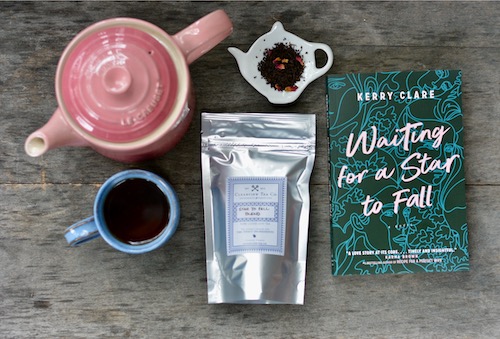
October 12, 2020
What the Trees Were Doing

We called them Sad Covid Walks, but only in hindsight. At the time we were walking, they were everything we had, during those months when traffic was deserted and the only ads in the transit shelters were telling us all to stay home.
We had a circuit through and around the university campus, a walk we took once a week to track the progress of spring. Two secret copses—one at the school of mining, the other at the faculty of forestry—and then the tiny Zoo Woods beside Sidney Smith Hall. Which at first were barren of anything green, just a trillium here and there, and then the season came on like a deluge. Never have I been more grateful for spring.
A woman in my blogging course last month wrote about that waiting, and watching the naked trees with an attention she’d never experienced before. About how as the leaves fall away again, she is trying to hold onto the promise of winter trees instead of sadness as the seasons change again.
We’ve taken such comfort from trees this year. Retracing our steps today even though we really didn’t want to, even though anything that was full-on in Covid spring, we’ve developed an aversion to (except for ice cream).
But I wanted to see what those trees were doing, to give thanks for the ways they have saved us, and the ways they persist, oblivious to everything, from the sad people looking up, to the pigeons in their boughs.
To their majesty, their steadfastness, and the admirable way they keep reaching for the sun.
October 8, 2020
You Get to Frame Your Own Picture

You don’t have to read the books on the shortlist. You don’t have to watch the debates. The world won’t end if you don’t know the latest numbers, unless you work for Public Health. Your timeline isn’t neutral. Neither are your Google searches. You are allowed to not be interested. You are permitted to sit this one out.
What gets to be important? Did anyone catch the sunset last night? I’m thinking about a person who doesn’t have their head in the sand, and how they have absolutely no idea what’s going on underground.
Who’s been keeping up with the cloud formations? Do you know how little bearing the stock market has on most people’s lives? The way the patch of sunshine travels across my kitchen table, which is a story I’m tracking. It’s important to pay attention.
A long time ago, you got to design your own internet, with the assistance of your aunt who’d send your forwarded jokes. She was a curator then, although we didn’t call it that, but the rest was up to you, the sites you bookmarked. I had a Google reader, and a list of blogs and websites that I’d check in with everyday.
But then Google killed their Reader–it’s harder to drive advertising with users who navigate the internet on their own say-so. And now it’s Facebook who decides what we should see, what we will watch, what we read, and what we’re thinking. And while at least newspapers and journalists control the narrative with some degree of responsibility and a sense of the importance of their role, it’s still never been the entire story. Always, there’s something else going on outside the frame. And something else is almost everything.
This week, I’ve been listening to the “You’re Wrong About” Podcast, after at least two people recommended it online. While various overwhelming calamities have been occupying the minds of many, I’ve been all wrapped up in the courtship of Charles and Diana, and I’m not sure why this matters any less than all the other kinds of other soap operas going on concurrently.
The other night, I was reading to my children from Madeleine L’Engle’s A Ring of Endless Light, and it referenced “Cartesian,” but my daughter thought I meant “Khardashian,” but it didn’t matter anyway, since she doesn’t really know anything about one or the other.
I think therefore I am?
This is the book where Grandfather, anticipating Twitter in 1980 (when the book was published), says to Vicky, “Maybe instant information isn’t good for us. We can’t absorb it.” And I think about this all the time, about how there is nothing “natural” about the news cycle. It’s as organic as the economy. And the idea that we have a duty to pay it our attention, to centre our experience of the universe around it. Like its a fire we’re all drawn to, but it’s not, and who profits?
Ten years ago, I started working at 49thShelf, which means that for a decade, people have been sending me lists of books and authors. In the beginning, most of the time those authors were white, and around 2012 people started calling this out. Why were so many of them men as well, and there were people who got angry about this, people who didn’t see race or gender, but just focused on excellence, and it was just a coincidence that all their favourite books were written by white men.
In 2020, very few people would dare submit a list that includes only a handful of old white guys, and not just because doing so would make me go YIKES!, but also because it’s just really boring. Because it betrays the narrow limits of a reader’s experience, and most of us don’t like to brag about those, and all this is relevant because it shows how arbitrary is the way that things are framed, among them literature, and “the canon,” and how I used to take those all-white-guy lists for granted.
The way I used to see them and think I was looking at everything.
October 7, 2020
A Bite of the Apple, by Lennie Goodings
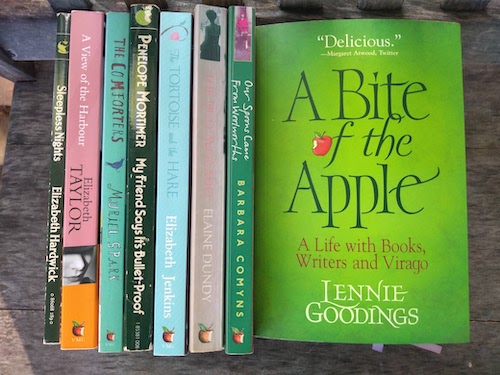
This book is everything. A memoir of Lennie Goodings’ 40 years in feminist publishing. The story of legendary Virago Press, which has meant a lot to me and so many other readers. A story of 40 years of feminism too, with fractious debate, changing trends, so much learning and thinking and growing. As a huge fan of mid century British women writers, my own stack of Virago books belies the press’s growing focus on intersectionality, and Goodings writes about that necessary change, her own growth and awareness, and missteps she made on the road to doing better. (It is refreshing to read about an older UK feminist who has not devolved into a raging bigot.)
In a moment of extreme division and polarization, this memoir is a balm. Goodings writes about taking inspiration from Virago author Grace Paley who called herself “a somewhat combative pacifist and cooperative anarchist.” Goodings continues, “Somewhere between these two options—fuck the patriarchy or keep plugging away for what you know is right— is how most women find themselves responding to sexism and inequality we need rage and inspiration we need realism and practical solutions and we need to know our histories literary and otherwise.” There is also the part about about how Decca Mitford and Maya Angelou were devoted friends and did a mean rendition of “Maxwell’s Silver Hammer”—WHAT???
And most of all, this is a book about books, celebrating the goodness of reading and the connections books forge. I loved it it. Turns out Goodings is Canadian too, and emigrated to England in the mid ’70s. Her book is out this month in Canada, published by the good people at Biblioasis.
October 6, 2020
Gleanings
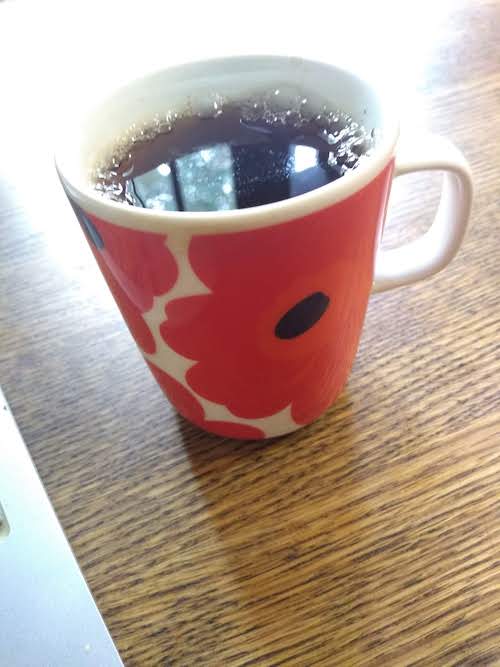
- I mean, how hard can it be? I had an idea, a story arc and time. All I needed to do was turn on the tap and it would flow out. Right?
- We made friends, we built a life—a good life—together, we have a language-for-just-us and code words and in-jokes.
- On Wednesday night I read the final chapter in Harry Potter and the Deathly Hallows to my youngest daughter—thus closing the chapter on one of the major post-diagnosis goals I had set for myself.
- What a joyful thing. Evoking a response, a thought, interpretation, connection through your own expression.
- “October, baptize me with leaves! Swaddle me in corduroy and nurse me with split pea soup. October, tuck tiny candy bars in my pockets and carve my smile into a thousand pumpkins. O autumn! O teakettle! O grace!”
- My truth is that the quiet, almost eremitic hours I spend in the forest, are sacred and essential – how I am able to find peace in this time of high anxiety.
- Every day my walk is the same. And entirely different.
- But when, like most of us, I ran low on white flour in April, I used whole wheat instead and discovered that the recipe wasn’t just as good as it was with white flour, but better.
- And thinking about archives at the same time because I was already lamenting that I’d never done the thing that I’d always thought I would do: keep a regular reading journal, keep track of everything I read, and when, and what I thought. I was disappointed in myself beyond words and then, man, I realized that if only I’d done the same thing with the quilts I’ve made over the past 35 years…
- The Voyage Out soon began to spill into other areas of my life.
- “I’ve trained myself to do many different things in small segments over the course of the day…..Yesterday I began by making a butternut squash cake for our meeting, then I worked on my kintsugi.”
- Sometimes you have to kill all your darlings. Throw the whole book out and start again from scratch.
- What I found most disturbing about the book is that I know Mattie Rigsbees.
- Just as a cook needs to learn to diversify in the types of foods and the differences in spices, cooking methods, and ingredients used, so too should a photographer embrace their own diversifications.
- Sometimes, writers of dark fiction blur the lines between horror and the psychological thriller.
- This year, I took a different kind of breather, challenging myself to walk 300 kilometres, or an average of 10k per day. On twenty-nine of those thirty days, I walked.
October 5, 2020
Waiting for a Star to Fall: THE SOUNDTRACK
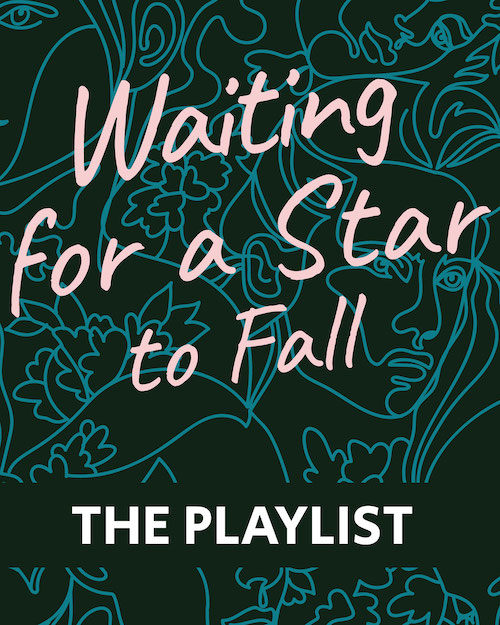
The question of why I insist on making playlists for my novels is definitely one worth asking, especially since all they really do is reveal me as a person whose taste in music is atrocious. But having come to terms with this fact, I can share that music is a really huge part of my process, of my entire life, and certain songs find their way into my fiction as a kind of subtle biography. These connections are rich and meaningful to me, not to mention catchy as all-get-out.
“Waiting for a Star to Fall,” by Boy Meets Girl
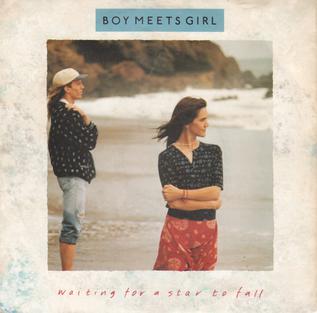
There was a really long period where the song “I Know You By Heart” from the soundtrack to the movie Beaches was in my head, and I can’t quite remember why. This was during the winter/spring of 2018, when I was thinking a lot about the plot of my novel even before setting down a word, and I was doing both of these things (having the song in my head and imagining the book) while I was swimming lengths at the pool.
But the weird thing was that “I Know You By Heart” in my head always ended up morphing into “Waiting For a Star To Fall,” famously the theme from hit film Three Men and a Little Lady.
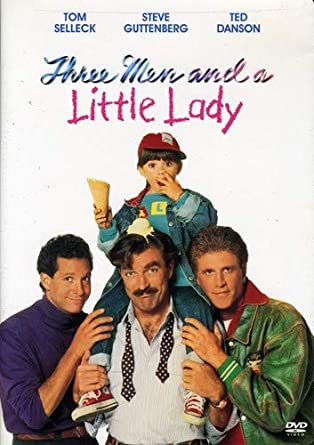
It all made some more sense when I googled and found out they were written by the same songwriting team (Boy Meets Girl!), and then I spent that summer actually writing the book while obsessively listening to “Waiting for a Star to Fall” on Youtube. I was addicted, to this song and also others with saxophone solos, but mainly Gerry Rafferty’s “Baker Street,” and then eventually Youtube’s algorithm started following “Waiting for a Star to Fall” with “Right Down the Line,” by Gerry Rafferty, which didn’t have a saxophone solo, but found its way into the DNA of the book I was writing.
All of this seems kind of random, I know, but then it gets even weirder. That December, my novel was still untitled (it went through a stage of being called “The Fall” or “This Downfall”) and I went to my friend Marissa’s 40th birthday party, for which she’d created a Spotify playlist, and “Waiting for a Star to Fall” came on, as a poppy ’80s tune might, and then it was directly followed by “Right Down the Line,” by Gerry Rafferty. What the heck?? Two songs not especially connected by era or genre, and one of them definitely didn’t appear on the soundtrack to Three Men and a Little Lady. I was a little drunk and sent a hysterical text message to my husband, who worked from home one day a week and knew my secret—that I basically listened to “Waiting for a Star to Fall” and “Right Down the Line” on a loop all day long.
It was really weird and excellent, and then in early January I realized that “Waiting for a Star to Fall” was actually the book title I’d been searching for, for the reference to a political superstar meeting his downfall, but also because the song is all about unrequited love and somebody who is waiting for impossible things, which my book is all about.
“How Will I Know?” by Whitney Houston
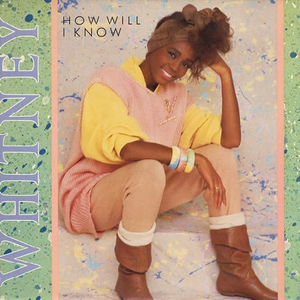
The Boy Meets Girl duo (Shannon Rubicam and George Merrill) wrote so many great songs, among them some of Whitney Houston’s greatest hits. “How Will I Know?” is one my favourite songs to sing at karaoke, and it definitely conjures themes of my novel, about being young and unsure when it comes to love—especially since feelings can’t always be trusted.
“A Case of You,” by Joni Mitchell
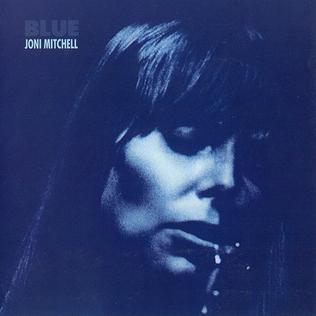
I don’t know that I have ever written a less autobiographical work of fiction than Waiting for a Star to Fall (my protagonist doesn’t read!!) but I was able to tune in to all my own early 20s angst and longing to strike the right note with my character. This song meant a lot to me in those days, and the part about the guy who is as “constant as a northern star/ constantly in the darkness” tied in well with my story and the celestial imagery.
“Laid,” by James
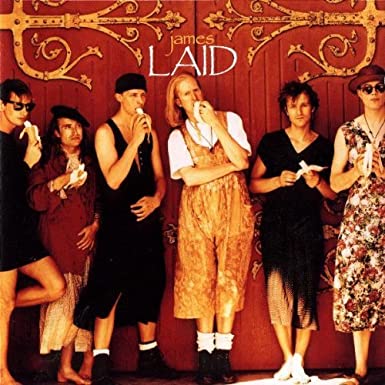
When I started going out to bars, this song was a mainstay, and I loved it for its aspirational qualities, though it was far from the realities of my experience most of the time. I definitely conjure those days in my novel’s depiction of the small town bar experience (Lanark’s notorious bar Slappin’ Nellies is probably recognizable as Peterborough’s Trasheteria circa 2000) and the best thing is that the nostalgic obsession of modern times means this ’90s track is not so out of place.
“I Don’t Wanna Miss a Thing,” by Aerosmith
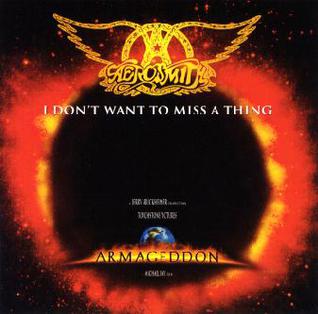
Yes, more ’90s, but my protagonist’s love interest is my age, so it fits. He’s a cheesy dude and his favourite movie is Armageddon, and this song appears on the soundtrack—and it kind of sums up his intense approach to life and all things.
“Right Down the Line,” by Gerry Rafferty
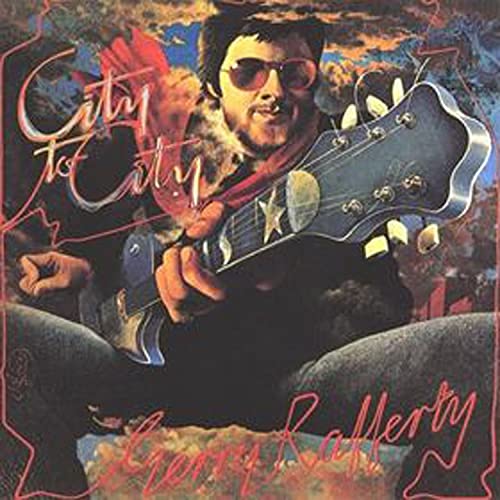
I love this song, but it’s kind of a crime, as are all songs like these, these songs that convince women that their role is to wait and serve in relationships with men, “to put something better inside of [their partners],” and that a bare recognition of this fact should suffice as repayment for the enormous debt this incurs. Do you ever wonder how your life might have been different had you not come of age on these tropes? I also always wondered if Rafferty’s “You’ve been as constant as a northern star, the brightest star that shines” was somehow in conversation with Mitchell’s. (Essential to note: I eventually paid for digital copies of this song and “Waiting for a Star to Fall,” and no longer am I constantly streaming Youtube.)
“Let the River Run,” by Carly Simon
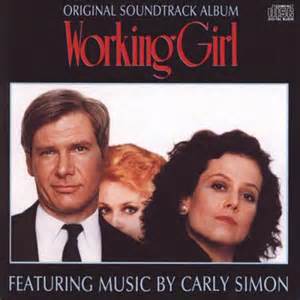
When my protagonist was a little girl, she used to watch her mother’s VHS copy of Working Girl, and then pretend to be a career woman by turning her family’s dining room table into a desk. (Please see Clementine Ford’s Instagram stories for a deep dive into why Working Girl is a very problematic feminist classic, another trope that works its ways into our veins to fuck us over. ) Carly Simon’s song was the best thing about this movie, except for Joan Cusack’s hair, and I still find the lyrics profoundly moving and poignant: (and yes, there is celestial imagery): “We the great and small/ Stand on a star/ And blaze a trail of desire/ Through the dark’ning dawn.”
“The Boys of Summer,” by Don Henley
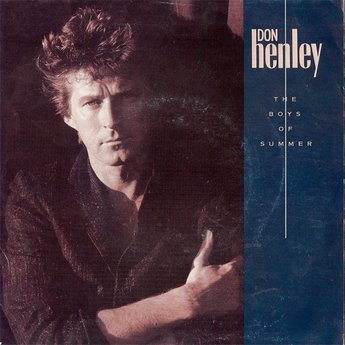
This has been one of my favourite songs for years and years, and it was long out of date even by the time that I started loving it. This appears in the novel when my protagonist is missing the guy she loves and goes driving by his house even though he’s not home.
“Invincible,” by Pat Benatar
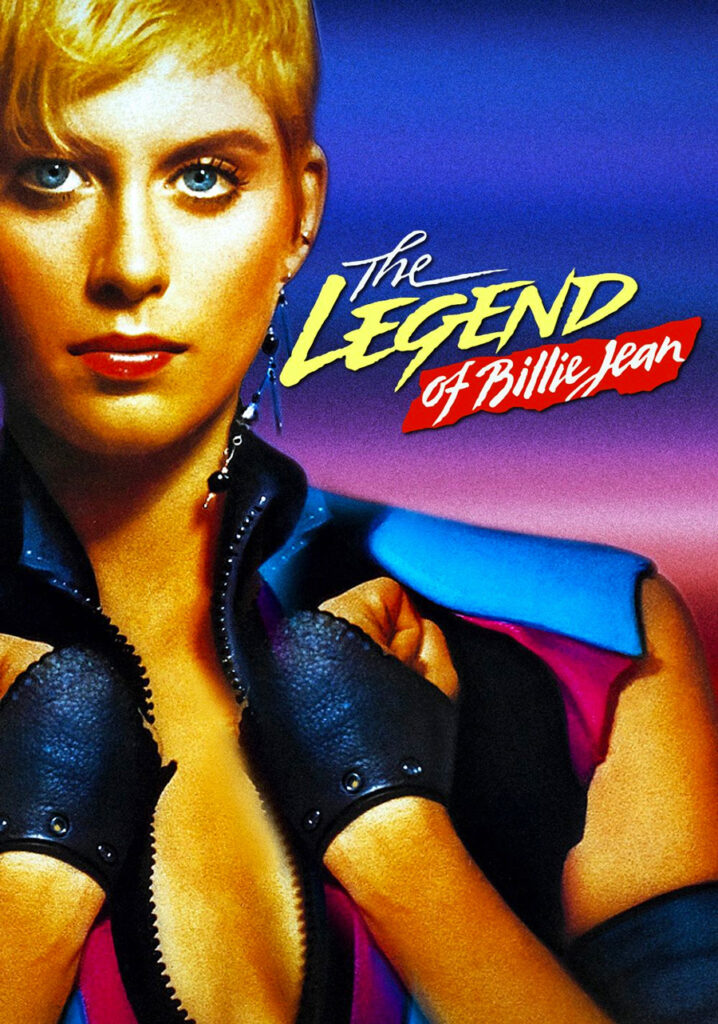
An abortion takes place in my novel (of course it does!) and the woman who experiences it is strong and secure in her experience because she’s cared for by her friends through it all. Like this character, I also watched The Legend of Billie Jean and ate ice cream cake after my abortion in the company of my pals, and this song is from the soundtrack. (I wrote about this here: “Abortion Baskin Robbins“)
“Be My Baby,” by The Ronettes
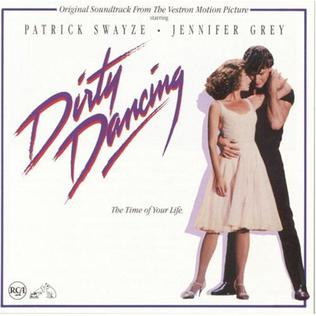
Brooke has never seen Dirty Dancing before until one afternoon when she watches it with her roommate, Lauren, summoned to their living room by this song with the opening credits. Its brave and radical abortion story-line is still radical even more than 30 years later, which is a travesty, but it provides my book with a pivotal plot point.
“Brilliant Disguise,” by Bruce Springsteen
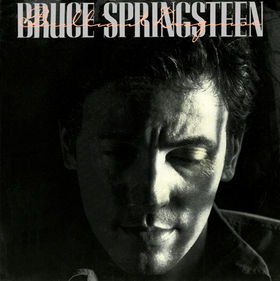
There is a reference to a brilliant disguise in the novel when Brooke goes out to Slappin’ Nellies with her roommate and gets dressed up in uncharacteristic style—would Derek recognize her? Definitely a fitting song about duplicitousness and how we can be fooled by the people we love.
“Two Princes,” by Spin Doctors
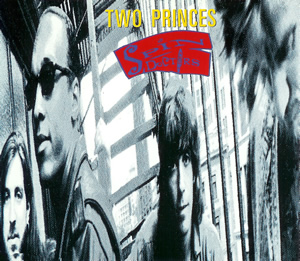
Naturally, the novel’s climax takes place at Slappin’ Nellies, where it’s Retro ’90s Night. Why are we so hungry for nostalgia? But oh, we are, as this playlist attests. I met my husband at a Retro ’90s Night and we danced to this song together, and it was only 2002. Retro becomes retro so quickly.
Bonus Track: “I Know You By Heart,” by Bette Midler
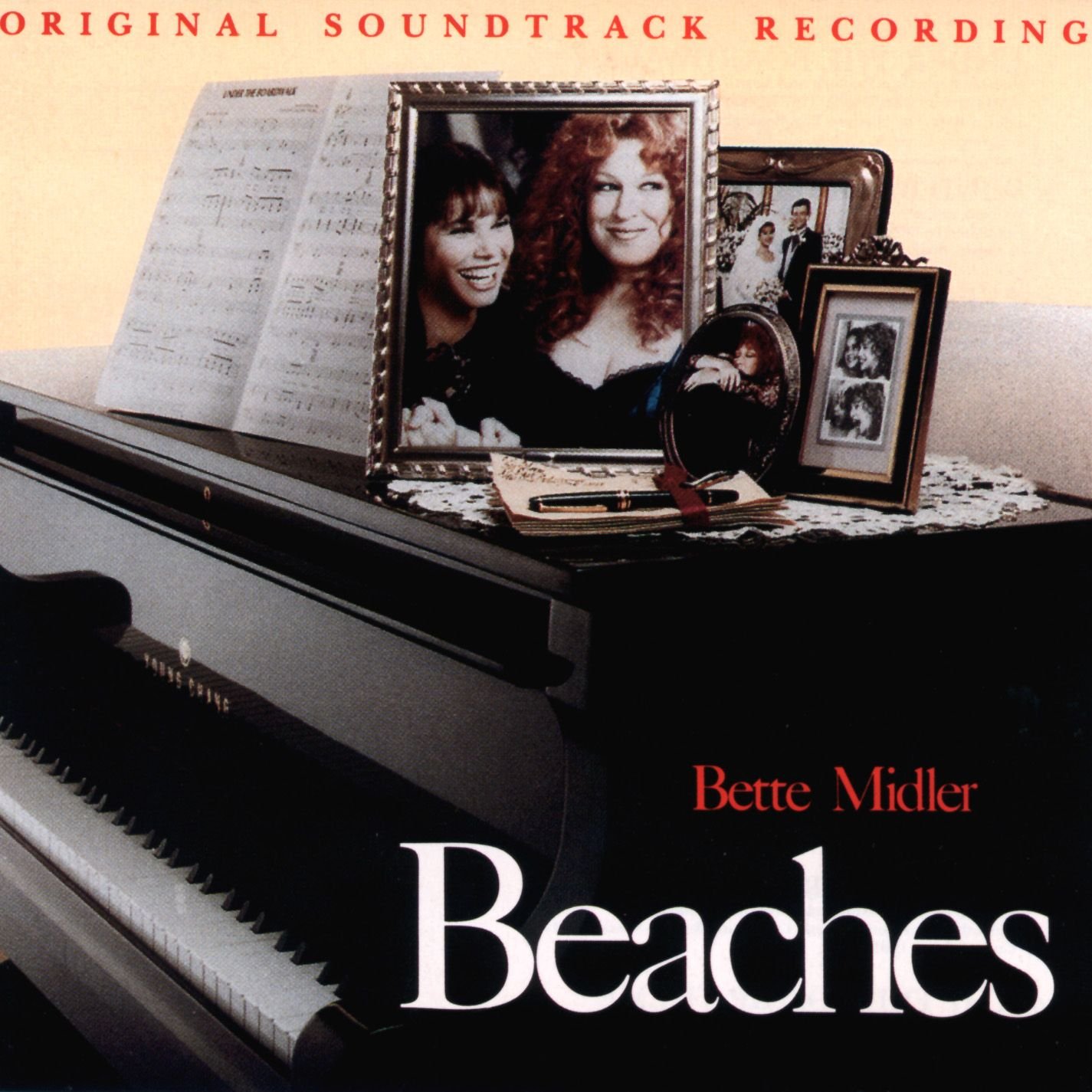
I actually think this song was in my head because the book I wrote before Waiting for a Star to Fall was about female friendship and had a Beaches vibe. I am back at work on the manuscript now and hope one day to share it with the world.
Bonus: “Good As Hell,” by Lizzo
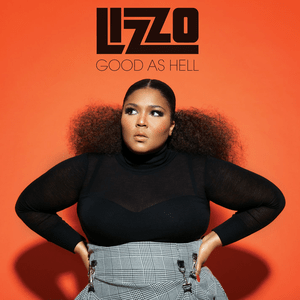
And yes, because my novel set in contemporary times deserves ONE SONG that came out this century. I think this song serves as a nice counterpoint to all those tunes about being constantly in the darkness, and yes, of course there’s a star: “You know you a star, you can touch the sky/ I know that it’s hard but you have to try/ If you need advice, let me simplify/ If he don’t love you anymore/ Just walk your fine ass out the door.”
If I had had this song twenty years ago, my early twenties might have been a lot less stupid.
October 2, 2020
Launch Week!
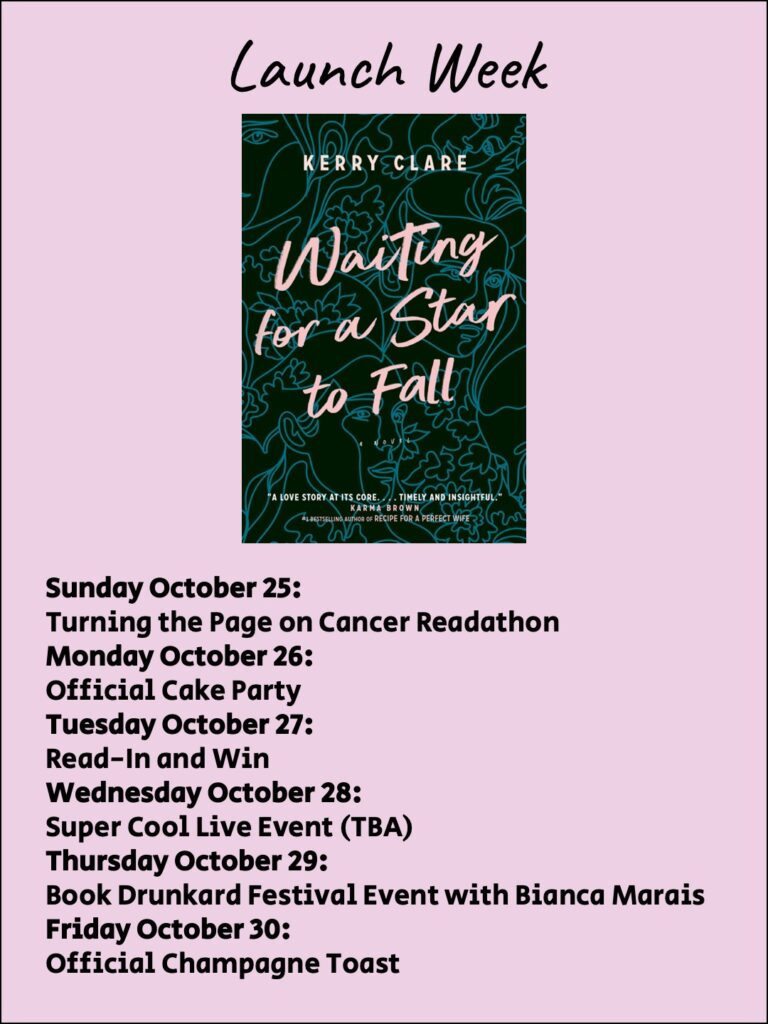
25 days until my book comes out!
In lieu of having a launch party, I am going to do what I do best, and stretch out celebrations into a whole entire launch WEEK, with lots of opportunities for you to be part of it.
Festivities kick off Sunday October 25 with the Turning the Page on Cancer Readathon. I will be one of many readers across the country sitting down with a book for eight straight hours, a fantastic feat of endurance (ha ha. Will I be doing a sleepathon next?) in order to raise funds and awareness to support people living with metastatic breast cancer.
How you can take part: Sign up for your own readathon. Donate to my fundraiser. Or just cheer me on via social media during the main event.
Monday October 26: Official Cake Party: I can live without a book launch party, but I cannot live without a fancy book launch cake. Fancy cake is on order. I am excited!
How you can take part: Have your own cake and eat it too. Make or purchase the cake you wish to see in the world. Watch for my cake on social media.
Tuesday October 27: Read-In and Win: OFFICIAL PUB DATE! A big day, especially for those of you who got your pre-orders in. Even more than a book launch party, to be honest, I am in love with the idea of readers across the continent curling up with my newly-released book.
How you can take part: Take a selfie of you reading WAITING FOR A STAR TO FALL, and share it online for a chance to win a $100 gift card to Inner Muse.
Wednesday October 28: Super Cool Live Event (TBA)
How you can take part: Stay tuned for my exciting announcement soon
Thursday October 29: Book Drunkard Festival Event with Bianca Marais. I’m so excited to be part of Blue Heron Books‘ festival this year!
How you can take part: Tickets for our event are $30 and include the cost of the book. Buy your ticket today!
Friday October 30: Official Champagne Toast. In which we pop open a bottle, and toast to a week well spent.
How you can take part: I appreciate all your virtual “Cheers!” Best delivered in your pyjamas, because it’s Friday night in a pandemic after all. And then we go to bed to read…
